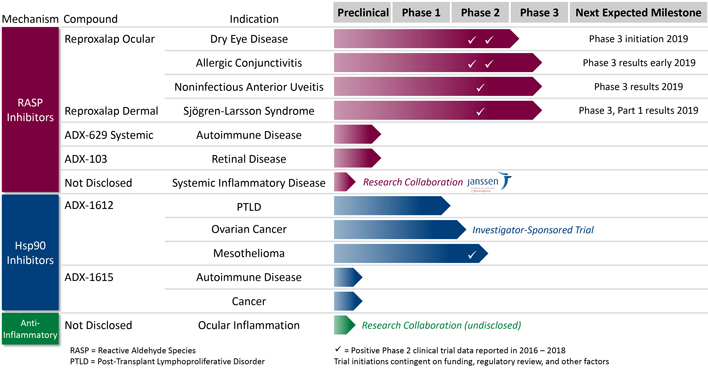| | • | | spend substantial operational, financial and management resources in integrating new businesses, technologies and products; and |
| | • | | assume substantial actual or contingent liabilities. |
Our internal computer systems, or those of our development partners, third-party clinical research organizations, or other contractors or consultants, may fail or suffer security breaches, which could result in a material disruption of our product development programs.
Despite the implementation of security measures, our internal computer systems and those of our current and any future CROs and other contractors, consultants, and collaborators are vulnerable to damage from computer viruses, unauthorized access, natural disasters, terrorism, war, and telecommunication and electrical failures. While we have not experienced any such material system failure, accident, or security breach to date, if such an event were to occur and cause interruptions in our operations, it could result in a material disruption of our development programs and our business operations. For example, the loss of clinical trial data from completed or future clinical trials could result in delays in our regulatory approval efforts and significantly increase our costs to recover or reproduce the data. Likewise, we rely on third parties to manufacture our product candidates and conduct clinical trials, and similar events relating to their computer systems could also have a material adverse effect on our business. To the extent that any disruption or security breach were to result in a loss of, or damage to, our data or applications, or inappropriate disclosure of confidential or proprietary information, we could incur liability and the further development and commercialization of our product candidate could be delayed.
We rely on email and other messaging services in connection with our operations. We may be targeted by parties using fraudulent spoofing and phishing emails to misappropriate passwords, payment information, or other personal information, or to introduce viruses through Trojan horse programs or otherwise through our networks, computers, smartphones, tablets, or other devices. Despite our efforts to mitigate the effectiveness of such malicious email campaigns through a variety of control andnon-electronic checks, spoofing and phishing may damage our business and increase our costs. Any of these events or circumstances could materially adversely affect our business, financial condition, and operating results.
Business disruptions could seriously harm our future revenues and financial condition and increase our costs and expenses.
Our operations could be subject to earthquakes, power shortages, telecommunications failures, water shortages, floods, hurricanes, typhoons, fires, extreme weather conditions, medical epidemics, and other natural or manmade disasters or business interruptions, for which we are predominantly self-insured. The occurrence of any of these business disruptions could seriously harm our operations and financial condition, and increase our costs and expenses. We rely on third-party manufacturers to produce reproxalap and our other product candidates. Our ability to obtain clinical supplies of reproxalap or our other product candidates could be disrupted, if the operations of these suppliers are affected by aman-made or natural disaster or other business interruption.
Our employees or others may engage in misconduct or other improper activities including noncompliance with regulatory standards, regulatory requirements, and insider trading.
We are exposed to the risk of employee and others, fraud or other misconduct. Misconduct by employees, consultants, or agents could include intentional failures to comply with FDA regulations, provide accurate information to regulatory authorities, comply with manufacturing standards we have established, comply with federal and state health care fraud and abuse laws and regulations, report financial information or data accurately, or disclose unauthorized activities to us. In particular, sales, marketing, and business arrangements in the health care industry are subject to extensive laws and regulations intended to prevent fraud, kickbacks, self-dealing, and other abusive practices. These laws and regulations may restrict or prohibit a wide range of pricing, discounting, marketing and promotion, sales commission, customer incentive programs, and other business arrangements. Our current and former employees, consultants orsub-contractors may also become subject to allegations of sexual harassment, racial and gender discrimination or other similar misconduct, which, regardless of the ultimate outcome, may result in adverse publicity that could significantly harm our company’s brand, reputation and operations. Employee misconduct could also involve improper use of information obtained in the course of clinical trials, which could result in regulatory sanctions and serious harm to our reputation.
In addition, during the course of our operations our directors, executives, employees, consultants, and other third parties may have access to material, nonpublic information regarding our business, our results of operations, or potential transactions we are considering. We may not be able to prevent trading in our common stock on the basis of, or while having access to, material, nonpublic information. If any such person was to be investigated or an action were to be brought against them for insider trading, it could have a negative impact on our reputation and our stock price. Such a claim, with or without merit, could also result in substantial expenditures of time and money, and divert attention of our management team from other tasks important to the success of our business.
41
